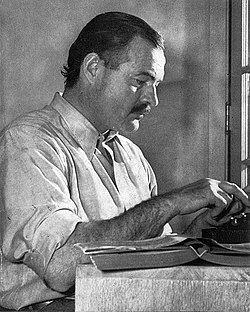Ernest Hemingway Quote
All I wanted to do was get back to Africa. We had not left it, yet, but when I would wake in the night I would lie, listening, homesick for it already. Now, looking out the tunnel of trees over the ravine at the sky with white clouds moving across in the wind, I loved the country so that I was happy as you are after you have been with a woman that you really love, when, empty, you feel it welling up again and there it is and you can never have it all and yet what there is, now, you can have, and you want more and more, to have, and be, and live in, to possess now again for always, for that long sudden-ended always; making time stand still, sometimes so very still that afterwards you wait to hear it move, and it is slow in starting. But you are not alone because if you have every really loved her happy and untragic, she loves you always; no matter whom she loves nor where she goes she loves you more.
All I wanted to do was get back to Africa. We had not left it, yet, but when I would wake in the night I would lie, listening, homesick for it already. Now, looking out the tunnel of trees over the ravine at the sky with white clouds moving across in the wind, I loved the country so that I was happy as you are after you have been with a woman that you really love, when, empty, you feel it welling up again and there it is and you can never have it all and yet what there is, now, you can have, and you want more and more, to have, and be, and live in, to possess now again for always, for that long sudden-ended always; making time stand still, sometimes so very still that afterwards you wait to hear it move, and it is slow in starting. But you are not alone because if you have every really loved her happy and untragic, she loves you always; no matter whom she loves nor where she goes she loves you more.
Related Quotes
About Ernest Hemingway
Hemingway was raised in Oak Park, Illinois, a suburb of Chicago. After high school, he spent six months as a reporter for The Kansas City Star before enlisting in the Red Cross. He served as an ambulance driver on the Italian Front in World War I and was seriously wounded by shrapnel in 1918. In 1921, Hemingway moved to Paris, where he worked as a foreign correspondent for the Toronto Star and was influenced by the modernist writers and artists of the "Lost Generation" expatriate community. His debut novel, The Sun Also Rises, was published in 1926. In 1928, Hemingway returned to the U.S., where he settled in Key West, Florida. His experiences during the war supplied material for his 1929 novel A Farewell to Arms.
In 1937, Hemingway went to Spain to cover the Spanish Civil War, which formed the basis for his 1940 novel For Whom the Bell Tolls, written in Havana, Cuba. During World War II, Hemingway was present with Allied troops as a journalist at the Normandy landings and the liberation of Paris. In 1952, his novel The Old Man and the Sea was published to considerable acclaim, and won the Pulitzer Prize for Fiction. On a 1954 trip to Africa, Hemingway was seriously injured in two successive plane crashes, leaving him in pain and ill health for much of the rest of his life. He committed suicide at his house in Ketchum, Idaho, in 1961.
